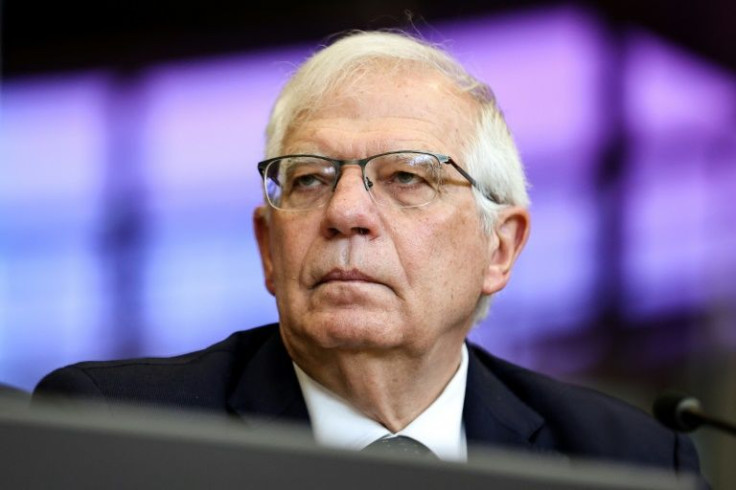EU Seeks Unity Amid Calls For Fresh Sanctions On Russia
Horrified by the devastation wreaked by Russian troops in Ukraine, EU foreign ministers launched discussions Monday on a sixth round of sanctions, but a consensus is proving increasingly difficult.
"Nothing is off the table, including sanctions on oil and gas," Josep Borrell, the European Union's top diplomat, told reporters after the meeting. "But today, no decision was taken."
At the same time, he pointed to an anticipated massive Russian assault on Ukraine's southeastern Donbas region, and said the main focus now needed to be on providing more military aid to Kyiv.
"Let's have no illusions. If you cut gas today, it's not going to stop the Russian army from waging war in the next couple of weeks," he said.
The EU ministers approved adding another 500 million euros ($550 million) to the one billion euros it has already approved for financing and delivering weapons to the Ukrainian government, although the decision still needed to be ratified by the parliaments of a couple of member states.
Borrell meanwhile warned that the bloc also needed to bolster its defences in another kind of battle: "A battle of narrative."
Russia, he said, was trying to blame a growing global food crisis on the international sanctions slapped on it, whereas the blame lay with Moscow, which Borrell accused of "sowing bombs on Ukraine's fields, (while) Russian warships have blockaded tens of ships full of wheat".
"Stop blaming the sanctions," he said. "It is the Russian military that is causing food scarcity."
Five rounds of sanctions have already been implemented since Russia's invasion of Ukraine on February 24, and Borrell said foreign ministers had discussed Monday "how to implement the sanctions to avoid any kind of loopholes," as well as "what else can be done".
The European Union is now committed to what European Commission chief Ursula von der Leyen says are "rolling sanctions" on Russia. But it has so far held back from those which would hit Moscow's coffers the hardest: a boycott of Russian oil and gas exports.
The fifth round of sanctions includes a ban on Russian coal imports into the EU -- an important first step towards what could become a broader prohibition on energy supplies.

Many ministers at Monday's meeting backed further energy sanctions, but they also stressed the importance of maintaining EU consensus and unity.
One obstacle to widening energy sanctions is Hungarian Prime Minister Viktor Orban, an EU leader close with the Russian president who won re-election to a fourth term a week ago.
Orban has refused to take them further. Yet EU sanctions require unanimity from all 27 member states.
Hungary and Bulgaria had meanwhile not blocked the move to release further funds to provide more weapons to Ukraine, as some had feared.
"They will pay their share of the 1.5 billion," Borrell said.
The dependence on Russian hydrocarbons of Germany, Austria, Bulgaria, Italy and some other EU countries has also made it difficult to find consensus on tightening sanctions further.
"But there are no flat 'No's', like there were in the beginning," Swedish Foreign Minister Ann Linde said after the meeting, acknowledging though that "this is not going to be a swift decision".
Polish Foreign Minister Zbigniew Rau complained that the EU was acting too slowly.
"We should have already introduced this embargo a long time ago," he said. "At the moment, the sanctions are inadequate."
Irish Foreign Minister Simon Coveney acknowledged that banning Russian oil was "very difficult for some member states".
But, he told reporters, "the European Union is spending hundreds of millions of euros on importing oil from Russia that is certainly contributing to financing this war".
© Copyright AFP 2024. All rights reserved.





















